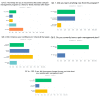An Electronic Teaching Module for Improving Knowledge of Self-Management of Vaso-Occlusive Pain Crises in Patients With Sickle Cell Disease: Pilot Questionnaire Study
- PMID: 31223120
- PMCID: PMC6610466
- DOI: 10.2196/13501
An Electronic Teaching Module for Improving Knowledge of Self-Management of Vaso-Occlusive Pain Crises in Patients With Sickle Cell Disease: Pilot Questionnaire Study
Abstract
Background: For patients with sickle cell disease (SCD), effective management of vaso-occlusive crises (VOCs) is integral to provision of care, as nearly all affected individuals will suffer from VOCs in their lifetime. A recent systematic review of technological interventions to improve self-management in the care of SCD concluded that electronic health has the potential to improve the care of individuals with SCD.
Objective: The aim of this study was to assess the value of an electronic teaching module (ETM) provided by Emmi Solutions for educating adult SCD patients on VOC self-management and treatment options for SCD.
Methods: A pretest assessed adults with SCD for baseline knowledge with regard to self-management of VOCs. Participants then watched the 35-min ETM and completed a posttest and survey on the ETM.
Results: A total of 20 adults enrolled. Their knowledge scores improved (pretest median 66.5% and posttest median 85%; P<.001). In total, 18 participants (18/20, 90%) agreed that they "learned a lot" or "learned something" from the ETM. The most common topic about which they reported learning was hydroxyurea. A total of 12 participants (12/20, 60%) agreed with the statement that they "would recommend the module to a friend or family member with sickle cell disease."
Conclusions: The ETM is associated with an increase in knowledge in patients with SCD. Limitations of the study include small sample size, no assessment of knowledge before premodule questionnaire completion, and no longitudinal follow-up. Identifying patients with SCD who demonstrate affinity for self-education via an ETM may further enhance utility of this tool to educate and empower patients.
Keywords: patient education; portable electronic applications; sickle cell disease; teaching materials.
©Tammie Tam, Maria R Baer, Lewis L Hsu, Jennie Y Law. Originally published in JMIR Mhealth and Uhealth (http://mhealth.jmir.org), 20.06.2019.
Conflict of interest statement
Conflicts of Interest: None declared.
Figures
Similar articles
-
The relationship between frequency and severity of vaso-occlusive crises and health-related quality of life and work productivity in adults with sickle cell disease.Qual Life Res. 2020 Jun;29(6):1533-1547. doi: 10.1007/s11136-019-02412-5. Epub 2020 Jan 13. Qual Life Res. 2020. PMID: 31933113 Free PMC article.
-
Does e-pain plan improve management of sickle cell disease associated vaso-occlusive pain crisis? a mixed methods evaluation.Int J Med Inform. 2014 Nov;83(11):814-24. doi: 10.1016/j.ijmedinf.2014.08.003. Epub 2014 Aug 17. Int J Med Inform. 2014. PMID: 25179666
-
Magnetic Resonance Imaging Assessment of Kidney Oxygenation and Perfusion During Sickle Cell Vaso-occlusive Crises.Am J Kidney Dis. 2017 Jan;69(1):51-59. doi: 10.1053/j.ajkd.2016.07.027. Epub 2016 Sep 20. Am J Kidney Dis. 2017. PMID: 27663041
-
Sickle cell disease pain management in adolescents: a literature review.Pain Manag Nurs. 2015 Apr;16(2):146-51. doi: 10.1016/j.pmn.2014.05.015. Epub 2014 Aug 28. Pain Manag Nurs. 2015. PMID: 25175555 Review.
-
Systematic Review of Crizanlizumab: A New Parenteral Option to Reduce Vaso-occlusive Pain Crises in Patients with Sickle Cell Disease.Pharmacotherapy. 2020 Jun;40(6):535-543. doi: 10.1002/phar.2409. Epub 2020 May 20. Pharmacotherapy. 2020. PMID: 32350885
Cited by
-
Impact of a digital manual for guidance on malignant hyperthermia: patient education.Orphanet J Rare Dis. 2022 Jul 15;17(1):265. doi: 10.1186/s13023-022-02435-1. Orphanet J Rare Dis. 2022. PMID: 35841058 Free PMC article.
-
Feasibility of an mHealth self-management intervention for children and adolescents with sickle cell disease and their families.Transl Behav Med. 2021 Apr 7;11(3):724-732. doi: 10.1093/tbm/ibaa132. Transl Behav Med. 2021. PMID: 33410488 Free PMC article.
References
-
- National Heart, Lung, and Blood Institute. Evidence-Based Management of Sickle Cell Diseasexpert Panel Report, 2014 https://www.nhlbi.nih.gov/sites/default/files/media/docs/sickle-cell-dis... .
Publication types
MeSH terms
LinkOut - more resources
Full Text Sources
Medical


